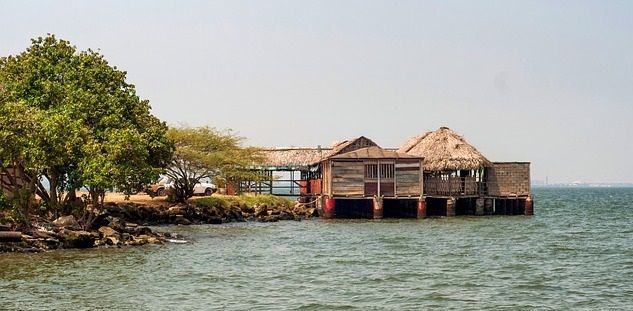Pirates in Venezuela lurk at Latin America's largest lake
Lake Maracaibo is a showcase for that level of violence. Pirates have killed at least 26 fishermen on its shores since August 2017, that is, one homicide per month.

Only the moonlit "el peñero", his small fishing boat, that night in June when the words came, with criminal intent, from the adjacent boat, which had approached at full speed, remembers Luis Alberto Morán.
A commando group of eight men was pointing firearms at the three sailors on the western shores of Lake Maracaibo, in the Venezuelan state of Zulia, 700 kilometers from Caracas.
Morán, captain of the 50-year-old boat and father of three daughters, was no longer leading a fishing operation. Instead, he coordinated the surrender of his crew at midnight.
"Keep lifting your nets! Get down and don't look! Whoever looks, we'll break it (kill)," the criminals shouted.
Terrified, they dared to raise their eyes only when the assailants ordered them, to give them the engine, their nets, and the baskets full of shrimp, remember Morán. They were ten eternal minutes, he says, then they have left adrift.
The captain and his subordinates used boards from the rock to paddle to shore. Meanwhile, they heard multiple shots from a distance.
Already on land, exhausted, they learned that private custody paid for by the fishermen of the area was shot at by the thieves. The bandits, they say, fled with a vast booty: 10 other fishing boats suffered the same fate of threats, theft of equipment, and shipwreck.
"They were robbing them all. We arrived desolate," says the captain, frustrated, sitting shirtless on a boat that rests this noon on the sand of the western coast of Lake Maracaibo.
Lake Zuliano is the largest lake in Latin America and the nineteenth largest in the world. It has 13,820 square kilometers of brackish and freshwater. Its basin is one of the areas of greatest oil wealth in the five continents.
The state-run oil company Petróleos de Venezuela reported that its subsoil stores reserves of 20.286 million barrels of crude oil. It is also ravaged by violent organized piracy gangs.
Shores of terror
Venezuela is one of the most dangerous countries in the world, according to the United Nations, which last month in its World Survey on Homicide revealed that Venezuela is the second most violent nation in the Americas, only behind El Salvador and the territories controlled by the Islamic State group.
The United Nations Office on Drugs and Crime (UNODC) said Venezuela experienced "the most dramatic increase" in murders on the continent between 1991 and 2017. It climbed from 13 to 56.8 homicides per 100,000 inhabitants.
The NGO Venezuelan Observatory of Violence reported 23,047 intentional murders in the country in 2018. It is a rate of 81.4 homicides per 100,000 inhabitants, according to its projections.
Lake Maracaibo is a showcase for that level of violence. Pirates have killed at least 26 fishermen on its shores since August 2017, that is, one homicide per month, according to a count of victims reported by the Venezuelan press.
There were four massacres of fishermen during assaults in their waters last year, according to police reports published by the local press. In the last one, in September 2018, five fishermen from Santa Rosa de Agua, a community in Maracaibo, were killed.
The criminals tortured the victims before killing them, the survivors said: they sprayed them with gasoline, walked over them when they were on the beach, naked; and some were partially mutilated.
Winton Medina, general secretary of the Fishermen's Union of the municipality of Miranda, affirms that the people he represents have suffered 147 robberies between January and July of this year.
Police reports have reported the deaths of at least 26 fishermen on Lake Maracaibo in the past two years.
That's an average of 21 robberies per month, not counting the numbers of the other 18 municipalities that share the lake's coastline, according to Medina.
Police sources report that 17 organized gangs operate in the 13,000 square kilometers of Lake Maracaibo, undermining the work and lives of approximately 30,000 fishermen.
Although they have been operating in the estuary for 30 years, their presence and violence have escalated in the last decade, according to fishermen from the coastal municipalities of Zulia.
The Zuliana police have arrested members of the mafias that operate in the lake. Reports to the press from military and civilian institutions, including the Bolivarian National Guard, the National Anti-kidnapping Command (Conas), the Coast Guard Command, and the Bolivarian Police Corps of the State of Zulia, show that the pirates use war weapons, such as light automatic rifles, shotguns, and high-caliber rifles.
The majority of the detainees are Venezuelans, although cases of undocumented immigrants have been reported. They are violent in approaching their victims, according to testimonies from affected fishermen. Operations against pirates are frequently carried out in a coordinated manner between military and police agencies.
Omar Prieto, governor of Zulia and a figure close to the disputed president Nicolás Maduro, activated in July a lake brigade that has 35 police officers, a speedboat, five rockers, eight motorcycles, and two patrols.
"We are going to give the front to the pirates who act, who harm, kidnap, murder, and extort the fishermen of Lake Maracaibo," the official told the press upon initiating the division.
Shared fear
A pestilent smell of gasoline, oil, and soaked sand reign on the beach of El Bajo, in the municipality of San Francisco del Zulia. The heat, humid and sticky, is around 35 degrees Celsius under shade on the day of our visit.
Rubén Morales, a 65-year-old Wayuu indigenous man, has a 43-year career in the trade in which he has been robbed three times in Lake Maracaibo.
He connects pieces of the nets quickly with a handcrafted needle of about 15 centimeters, sitting on a stool between two boats out of service.
"You didn't see that before. You could fish quietly, all the time," he says, feeling nostalgic.
Today, hunger is striding along the coast. Without much success in the previous night's fishing, the fishermen of El Bajo think of satiating themselves by eating coconut, almonds, or mangoes.
However, a dark-skinned fisherman, with his panties blackened by the oil that abounds in the lake, descends from a boat with a pair of buckets full of fresh fish. Salvation.
Johan Morán, 35, begins enlisting them on a counter at the kitchen station. He stabs a knife into the head of a silvery ax before gutting it and expertly removing its scales.
In the meantime, he says he has been robbed seven times in the lake.
"Pirates don't let you work. We always have to keep an eye on things," he says, shredding the lunch of the crews of nine boats.
He says he dodged death in the lake two years ago. He says his cousin, Alexander, and one of his best friends, Daniel, invited him to fish one night in early 2017.
He excused himself to visit his family. "I didn't want to go," he details, concise. He is suddenly saddened.
There was a massacre on that day, Johan says. Alexander, Daniel, and the rest of his crew tried to defend themselves with bullets from a pirate assault, he says with pain. His cousins were mortally wounded. He remembers that their bodies floated days later.
"That was a very big pain for the family," he says more distressed, washing his hands in a tap that connects to the seawater.
Sometimes one gets lucky
If you survive an assault on the lake, you're lucky. It happened to Manuel, a slender fisherman, with a profuse beard and wasted teeth, in the municipality of Cabimas.
Lying on a wooden pillar, on a concrete floor, and under the shade of a palm roof about ten meters from the water, he vividly recalls the assault he suffered three years ago with four of his companions in the eastern strait of Lake Maracaibo.
"You're being robbed, get down!", he says, also imitating the voice of the bandit leader.
He prefers to be called Manuel because he fears that he will be killed for being a " Sapo", as informants are popularly called in Venezuela.
He was robbed at 10:00 p.m. on the eve of Holy Thursday 2016. He says five armed men in a twin-engine boat intercepted his boat upon returning from a successful shrimp fishery.
He says they were taken to an abandoned oil rig. They were turned upside down, while other criminals took their boat, their engine, and the 300 kilos of shrimp they had caught.
He says they were saved because the chief of the thieves ordered his accomplices: "Leave the lads be, they are collaborating".
They were thrown into the lake, 500 meters from the shore, near the La Salina complex, an artificial island of Petróleos de Venezuela.
To be thrown into the lake, with waters up to 30 meters deep, is the same as a death sentence if there is no resistance or visibility, says Manuel. He and his colleagues managed to reach a rocky area on the shore.
Contagious anguish
The anguish of the fishermen of Lake Maracaibo is experienced by their partners and families. Yucseby Lopez, 33 years old, waits every day for her husband with her children in anxiety.
Her fears are stirred by the barking of the dogs that guard the home. They alert the arrival of the boats in the middle of the night.
She has developed a habit: she listens to them, stands on the shore, stares at the boat, and counts how many crew members return. When she identifies her husband, the calm returns. She breathes a sigh of relief. One morning at a time.
Source: Voz de America




